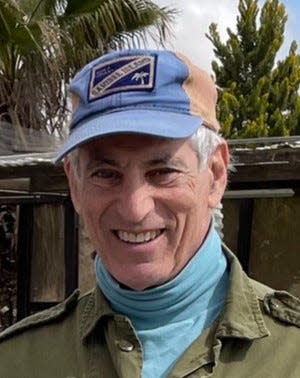Reflections of a Sanibel physician on his trip to Israel and the war
Greatly upset by the October 7 atrocity and the events that followed, I decided to act.
Organizations have been sending volunteers to work in Israel for decades. I signed up with an organization (Sar-el) that has been providing volunteers to military bases since the 1980’s. From Sunday afternoon until Thursday afternoon, we lived and worked on a military base.

Our group consisted of Jews and Christians, old and young, men and women, from around the world. People came from France, Germany, Netherlands, UK, Australia, Columbia, Brazil, Hong Kong and all parts of the U.S. We slept in barracks or tents, one for men and one for women, (husbands with the men and their wives with the women) and ate with the soldiers.
The soldiers were younger than us, also a varied group: male and female, Jews, Druze, Bedouins and Arabs, and a mixed multitude of national origins. We met soldiers who came from the U.S., Scotland, Australia, Brazil, Colombia and Russia in addition to those born in Israel.
We saw soldiers with tattoos and piercings as well as those wearing skull caps, having side curls, and some who wrapped tefillin for prayers before starting work in the morning. A fact expected in a pluralistic welcoming society and not compatible with the widespread accusation that Israel is an "apartheid" state. (Some say Israel is apartheid because those living in the West Bank or Gaza, who are not Israeli citizens, have different living conditions. That is like saying the U.S. is apartheid because day workers from Mexico have different living conditions. This is especially false for Gaza where Hamas controls the living conditions.)
All the meals were kosher. This was accomplished by eating dairy for breakfast and supper in dining areas near where we slept with lunch being a meat meal in a dining area near where we worked.
The first two weeks my group, and there were a number of groups going different places, worked on an assembly line packing boxes of food, around 7,000 a day. Each box provided one meal for four soldiers. All the boxes were "Kosher for Passover." This meant no bread was allowed in the building where we did the packing. They told us it was always "Kosher for Passover" so there was no need to have repeated ritual cleanings. The boxes had fruit, vegetables, dessert and protein. The main protein was tuna packed in oil. We learned that the soldiers opened the tuna can and used paper to soak up the oil, then lit the oily paper to generate a hot meal.
The boxes also had three garbage bags. No IDF littering, even in time of war. The days were long, starting with breakfast at 6:30 a.m., a bus ride to the warehouse where we worked. After supper we would have an educational meeting talking about Israel, the IDF or learning about each other, ending around 9 p.m. Assembly line work is either boring or hectic. During the boring times we were able to talk with the soldiers working next to us, at least the ones who spoke English. Most were new recruits. All were friendly, interested in learning about us and thankful we came to help. All were looking forward to their future in a peaceful Israel. None were angry or fearful. None seemed upset by the media portrayals that had bothered me.
∙ The first two weeks there I saw no hint of a country at war. The traffic on our bus rides made me glad to be dozing in a bus. To follow, week three, the most enlightening.
Michael Raab, M.D. is a resident of Sanibel.
This article originally appeared on Fort Myers News-Press: Reflections of a Sanibel physician on his trip to Israel and the war
